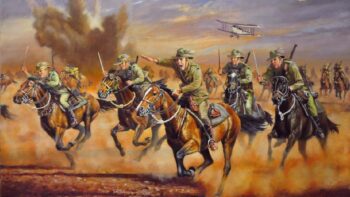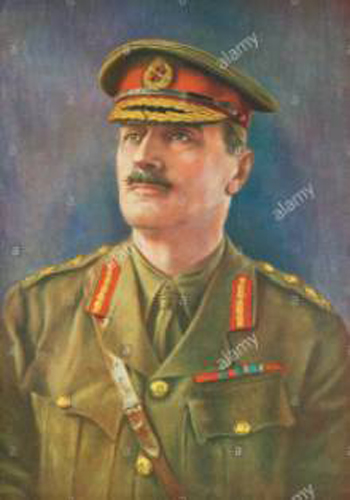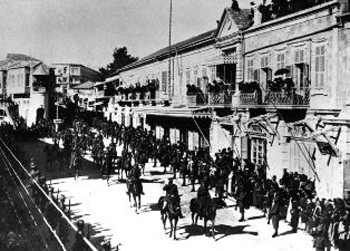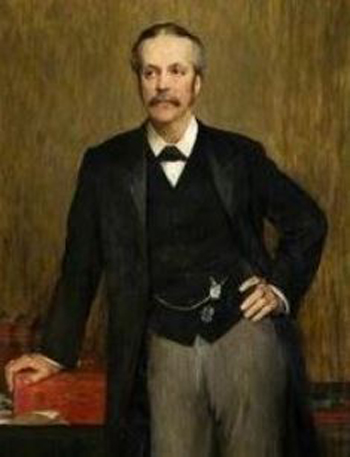By Christopher Proudlove —

In October, 1917, UK Prime Minister Lloyd George urged his new Middle East general, Edmund Allenby, to give the nation a gift for Christmas, the holy city of Jerusalem which had been in the hands of Ottoman Turks for 400 years.
Yet Allenby faced ignominy during the ensuing Battle of Beersheba after twice being driven back from the Turkish line from the Gaza Strip to the desert town of Beersheba, once the dwelling place of the father of Israel, the prophet Abraham.

Fifty-thousand British and Commonwealth troops and their numerous horses and camels urgently needed water. They were saved by the amazing feat of 800 Australian and New Zealand Light Horse Brigade soldiers who changed the course of history with an old-fashioned cavalry charge.
General Allenby called it “the last and greatest cavalry charge in history.”
The officer who came up with the daredevil plan, Harry Chauvel, rose to become one of Australia’s most distinguished and decorated army generals.
The brigade and its tough “Waler” horses were mounted infantry, not a cavalry regiment, but Chauvel insisted they could break through enemy lines. The icing on the cake would be access to Beersheba’s 19 wells.
Sir Edmund Allenby, victor of Palestine, thought the plan was “mad” but nevertheless consented to the surprise action as there was no alternative.
The German officer commanding the Turkish defenses, seeing the Light Horsemen begin their charge, described them as “madmen.” They had no swords or lancers just rifles and bayonets designed for infantry warfare.
The enemy troops were caught napping. From 6,000 yards out, the “Walers” could “sniff” the water wells. Riders clung for dear life on as the enemy lines rapidly approached as the horses desperately wanted to quench their thirst. Bullets and shells sailed over the riders’ heads as the Turks failed to lower their weapon guides fast enough.
As the Anzacs leaped over the enemy trenches a loud cheer went up from the British ranks. Even some Turks stood and applauded, such was the magnificence of the feat. Although hopelessly outnumbered and outgunned they fearlessly charged on. Beersheba — the gateway to Jerusalem — had fallen to a supposedly outmoded military action.
The Anzacs suffered just 31 troops killed and 36 wounded as they captured 750 Turks and their territory.
Alec Hepburn’s book, True Australian War Tales, states: “Many nations claim to have mounted the last cavalry charge in history, but most of these actions were minor skirmishes of no real significance towards the outcome of the war in which they fought. The Australian Light Horse attack on Beersheba was the last important cavalry charge in history and the last to win a resounding victory that altered the course of a war.”
Within weeks the Allies had reached the outskirts of Jerusalem. Allenby used two planes to drop surrender leaflets in the ancient city. It was the first time that aircraft had been used in this way. Muslims willingly obeyed Allenby’s request.

The Royal Flying Corps’ action had been foretold in the Bible some 2,700 years earlier: “Like birds hovering overhead, the Lord Almighty will shield Jerusalem; he will shield it and deliver it, he will ‘pass over’ it and will rescue it” (Isaiah 31:5). This passage was required reading in all Anglican churches that week!
Jerusalem surrendered without a shot being fired, helped by the similarity of Allenby’s signature to the Arabic (Al-Nebbi) for the prophet Mohammed.
As the triumphant Allenby entered the city through the Jaffa Gate, his honor guard was made up of slouch-hatted Aussies. Opposite him, as Allenby stood on the steps of the Citadel of David, he was encircled by another honor guard of proud ANZAC Light Horsemen. Their magnificent effort was being honored by Allenby for all the world to see.
Many of the Light Horsemen were visibly moved when they realized they had opened the gateway to the Holy Land, a doorway which had been firmly shut for many centuries.
History has not been sufficiently kind to these magnificent mounted Anzacs. Most, including Australians, are unfamiliar with what they achieved.
Even the capture of Damascus was accredited to Lawrence of Arabia and his Arab army, but the truth is the Light Horsemen had taken the city one week earlier, but had to hide while Lawrence’s ego was appeased, allowing him to parade into the city as the conquering hero.
And so, in Jerusalem on December 11, 1917, Allenby declared British military rule from the ancient steps of the Tower of David, opposite to Christ Church, headquarters of the Church’s Ministry Among Jewish people (CMJ) who had done so much to convince political and church leaders of Israel’s destiny under God.
Allenby dismounted from his horse at Jaffa Gate declaring: “It does not behove me, a Christian, to enter the City of my Messiah mounted.”
The ground had been well prepared during the previous century by British evangelical Christians such as William Wilberforce, Lord Shaftesbury, Charles Spurgeon, Bishop JC Ryle, who believed that Jewish redemption is a fundamental aspect of biblical truth.
They in turn influenced the movers and shakers of the age, backed up by the rise of Jewish Zionism under Theodor Herzl. The result was the Balfour Declaration in which Britain promised the Jewish people a “national home” in Palestine — an event of global historical importance.
Most of Lloyd George’s 1917 War Cabinet were from Evangelical Christian stock. The only member strongly opposed to the policy, Edwin Montague, ironically was Jewish.

Lord Arthur Balfour, Foreign Secretary at the time and a former Prime Minister, declared on his deathbed that aiding Jewish restoration was possibly the most worthwhile thing he had done. Also in the cabinet was South Africa’s Jan Christian Smuts. He had long predicted that a great Jewish state would arise once more.
Former US Secretary of State Henry Kissinger says that if there is a “hinge of history” on which the modern concepts of world order turned, it was the years just before, during, and after the First World War. The Balfour Declaration is at the core of that transformation.
It stated: “His Majesty’s Government views with favour the establishment in Palestine of a national home for the Jewish people, and will use their best endeavors to facilitate the achievement of this object, it being clearly understood that nothing shall be done which may prejudice the civil and religious rights of existing non-Jewish communities in Palestine, or the rights and political status enjoyed by Jews in any other country.”
Former United States Secretary of State and National Security Advisor, Henry Kissinger, noted: “The Balfour Declaration was issued with the State of Israel as the assumed eventuality. Balfour told Churchill that ‘by the Declaration they (the Foreign Office) always meant an eventual Jewish state.’ This assumption was institutionalized in the Mandate System, which imposed upon the victorious powers, most notably the British Empire, the responsibility to prepare the peoples of the mandate for statehood.”
Kissinger concluded: “The basic challenge of our period is twofold: to ensure the legitimacy of existing states as a basic premise; and to contribute to the settlement of their disputes by peaceful means.
“In the end, then, the importance of the Balfour Declaration resides not only in establishing a homeland for a people, but in contributing to peace in the world and hope for mankind.”
Since Israel became a nation again in 1948 it has contributed much to the world in its advancement of science. It deserves more support from the so-called Christian nations in the face of opposition from Muslim majority nations, particularly at the United Nations.



